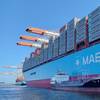Marine Construction:
Protecting Contractors As They Enter New Waters.
As the economic recovery continues to sputter along, construction companies eager to land any available projects have found themselves bidding outside their normal scope of work. Maritime construction is one such industry that has seen an increase in contractors who may not typically work on marine-related projects, thereby increasing the likelihood that individual projects may fall outside their skill set.
While contracts in marine construction present opportunities for income, they also present potential risks which can negatively impact a business’s bottom line. Contractors who work almost exclusively in the maritime construction business generally understand the unique risks, and recognize the need for specialized ocean marine insurance coverage. Other contractors who are not as accustomed to the particular facets of this industry may not be aware that a job with just a small amount of waterside work creates a marine component, let alone see the need for customized insurance coverage.
New Risks Bring New Regulations, too
Marine construction opportunities bring not only a new set of risks, but may also implicate different laws and regulations to keep in mind. In addition to compliance with the workers compensation laws of various states, consideration may also need to be given to the application of the Jones Act for vessel crew and to the federal Longshore and Harbor Workers’ Compensation Act for some workers. Without the proper insurance coverage, contractors can be responsible for payouts and benefit claims that could cost the business far more than a typical workers’ compensation claim.
Contractors participating in projects with a marine component, no matter how small, need customized insurance coverage to properly protect their employees and their businesses. Standard coverage for land-based contractors may often exclude coverage for marine-related exposures. Agents and insurance companies who understand the intricacies of both ocean marine and construction are best suited to provide the broad quality protection that such a business needs.
Fitting In
Today’s marine construction industry consists of a wide variety of players such as dock builders, contractors building a road over a small waterway, or primarily land-based contractors working on various facets of building a 200-slip marina; each with vastly different levels of involvement and varying sets of risk exposure.
The dock builder would be more familiar with working on marine construction projects and would be likely to contact an insurance agent at the onset in order to be sure there is adequate coverage for marine risks, such as dock workers moving in and out of the water. This could also include liability protection for construction vessels onsite which could accidentally scrape the side of a private boat during the project, or become loose in a windstorm and damage a number of boats in a nearby marina.
However, the primarily land-based contractor may not realize potential marine exposures. For example, can the body of water at the jobsite be considered “navigable?” If a canoe can be maneuvered across state lines while remaining in the water, then the waterway may be considered navigable and could be argued to subject the project to a whole new set of laws and regulations, such as the Jones Act. Also, if the contractor is renting a barge and/or a floating crane for bridge construction, special coverage is likely necessary to protect the crew, the floating crane and the barge.
Finally, the land-based contractor entering new territory may be exposed to unfamiliar exposures that could include operating floating cranes, barges or tugboats, employing divers, and compliance with environmental regulations. While mainly a dry land operator, this contractor may think his or her standard general liability coverage and umbrella policy will cover operations on the water; but it may not. For these types of projects, the contractor should work with an agent who can build a customized package, including perhaps a bumbershoot policy that covers excess liabilities for both marine and non-marine exposures.
An insurance agent may be able to suggest various ways to approach each marine-related project, whether it’s drawing up an expanded general form that addresses the marine risks, developing a customized package, or adding a special coverage.
Off to a Good Start
Contractors bidding on projects within the maritime industry should be aware of the risks that lay ahead, the coverages available to protect against those risks and any associated costs before presenting a proposal. The right insurance agent can provide streamlined insurance products and services tailored to fit contractors’ needs as they relate to each specific job. That agent can provide products and services that can lead to faster and more accurate bid submissions, as well as provide valuable risk control counsel to help protect the contractor’s employees after the bid is won.
Because marine contractors are subject to bid specifications for each job, they are more likely to need to meet with an agent on a regular basis – rather than just at renewal time. With such specific needs, an agent experienced in ocean marine and construction insurance can best determine the appropriate coverage necessary along with possible coverages that may not be needed for the particular project. An experienced agent may also be able to identify some unnecessary and costly bid requirements – potentially leading to cost savings for both parties.
With frequent agent interaction as a key to finding the right coverage for marine construction projects, contractors will want to look for insurance agents and insurance companies with a local presence. Companies with field offices across the country offer convenient access to underwriting and claim specialists. Finally, before signing on with an agent, contractors should ask for references and find out what other construction companies the agent has insured.
Marine construction is complicated, and it can be difficult for contractors to understand all the potential risk exposures. Smart contractors, who want to take on new jobs with marine components, should work closely with insurance agents who specialize in both the wet and dry sides of the business. The agent should be connected to an insurance carrier with a proven track record in marine construction, serve as a trustworthy advisor for coverage needs and risk mitigation, and have the resources to determine the best insurance products and services to fit the unique needs of any marine construction job.
+ Taken from the June 2012 print edition of MarineNews magazine +
- Ken Baldwin is Chief Underwriting Officer, Travelers Ocean Marine













